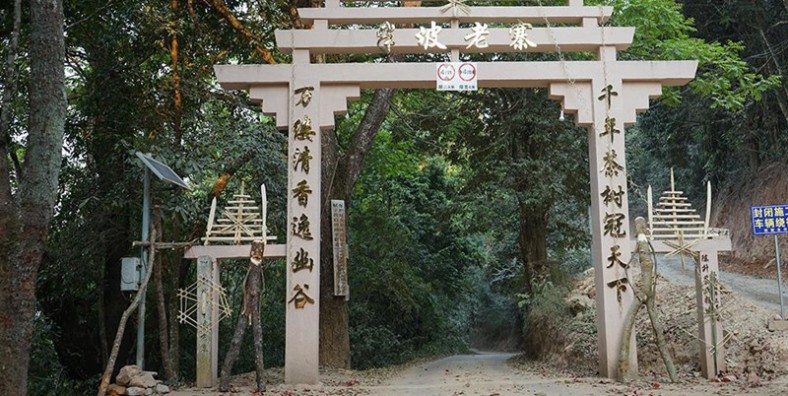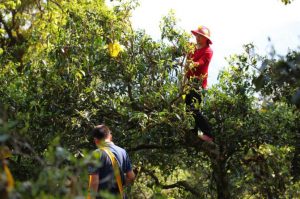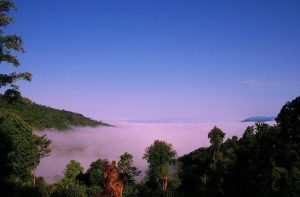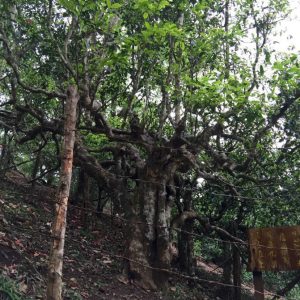 alt="Puer Surrounding Counties and Towns: Weekly & Special Local Markets Travel Guide"
/>
alt="Puer Surrounding Counties and Towns: Weekly & Special Local Markets Travel Guide"
/>
Nannuo Tea Mountain in Menghai County, Xishuangbanna

Chinese Name: 南糯茶山
Chinese Pinyin: Nan Nuo Cha Shan
English Name: Nannuo Tea Mountain in Menghai County, XishuangBanna
Type: mountain, tea plantation, ethnic minority
Opening Hours: the whole day
Recommended Visiting Hours: one day
Location: Gelanghe Township, Menghai County, Xishuangbanna, Yunnan

Nannuo Tea Mountain
Nannuo Mountain is famous in China and abroad as the home of the “King of Tea Tree,” a human cultivated 800+ year old tree. Fine tea tree varieties and superior natural conditions produce outstanding Nannuo Mountain tea products. Nannuo Mountain Peacock tea is a 400 gram fresh Pu-er cake. It possesses a green, glossy luster and has leaves and buds that are plump, strong, and tender. The strips of tea unfold with prominent fine hair. When brewed, the tea liquor is a bright golden yellow with a strong, but mellow and refreshing flavor. It has a sharp kougan (feeling in the mouth) and stimulates salivation. The tea has strong and distinctive aroma.
Here, travelers can feel the emotion of King of Tea Tree, enjoy the favorable flavor of tea plantation, step into the Hani Villages and experience the local custom and taste the natural inviting potherbs and wild fruits.
Why is Nannuo Tea Mountain so special?
Nannuo Mountain is famous in China and abroad as the home of the “King of Tea Tree,” a human cultivated 800+ year old tree. Fine tea tree varieties and superior natural conditions produce outstanding Nannuo Mountain tea products. Puer Tea is mainly made of tea of Nannuo Mountain. Nannuo Tea Mountain become famous with the selling of Puer Tea at home and abroad.
Menghai tea factory has released this Peacock series of single-estate tea mountains since 2001. They represent some of Menghai Tea Factory’s most sought after teas and are produced in very limited quantities.
Ethnic Villages in Nannuo Mountain
Villages in Nannuo Mountain consist of Banpo Laozhai Village(半坡老寨), Duoyizhai Village(南糯山多依寨村), Guniang Village(姑娘寨), Yakou Xinzhai Village(丫口新寨), Laozhai Village(老寨), Shitouzhai Village(石头寨),Zhulincun Village(竹林村寨) ,Xiangyang Village(向阳寨) and Shuihe Village(水河寨).
Where is Nannuo Tea Mountain?
It is located in the eastern portion of Menghai County of Yunnan Province’s Xishuangbanna Prefecture. It has an average elevation of 1400 meters above sea level. The entire mountain is covered in shaded forests of green bamboo and other trees. Ecological conditions are excellent. Nannuo Mountain tea trees are large-leaf arbor-type.
Nannuo Mountain Travel Guide
Nannuo Mountain Village is located in the Gelanghe and Hani Autonomous Township of Menghai County. It is the eastern gateway to Menghai and the starting point of the “Seven Sons Cake” tea culture tourism route. Known for its titles such as “Global First Ancient Tea Village,” “First Ancient Tea Mountain,” and “Place of Climate Transition,” Nannuo Mountain enjoys a pleasant climate with an average annual temperature of 17.9°C. The area is renowned for its beautiful ecological environment, rich ancient tea tree resources, including 800-year-old cultivated tea trees and 12,000 acres of contiguous ancient tea gardens. It also features the historic Menghai Tea Factory No. 1, which was the first mechanized tea processing plant in Yunnan, established in 1938. The village maintains a rich ethnic culture, with well-preserved Hani ethnic costumes, traditional dwellings, indigenous songs and dances, and distinctive festivals. The long history of tea cultivation and processing has resulted in a deep and rich Hani tea culture.
First Stop: Hani Cultural Park
Hani Cultural Park is located 24 kilometers from Jinghong on the Menghai highway. It is a convenient place to explore and learn about Hani culture. The park includes the Hani Ethnic Museum, traditional Hani dwellings, ethnic tourism, handcraft displays, and specialty Hani restaurants. Visitors can learn about Hani clothing, tea culture, weaving techniques, farming culture, and daily life.
Second Stop: Nannuo Mountain Viewing Platform
The Nannuo Mountain Viewing Platform is located along the route between Gu Niang Village and Duo Yi Village. Climbing the platform in the morning dew offers a view of the city of Jinghong with its distant lights and the nearby peaceful Hani villages. After rain or in the early morning, you can observe the white mist rising from the valleys, sometimes light and ethereal, sometimes surging and turbulent, like waves rolling through the mountains. Amidst the sea of clouds, the Hani villages appear faintly, resembling islands in the clouds, creating a beautiful, otherworldly scene.
Third Stop: 800-Year-Old Tea King Tree
The Tea King Tree is located in the Banpo Laozhai village group. Follow the stone-paved walkway to the Banpo Laozhai Ancient Tea Garden. Along the way, you will see rows of ancient tea trees with sunlight casting dappled beams. The wind, bird calls, and insect chirps create a harmonious background. Proceed to find the 800-year-old cultivated tea tree standing majestically on the hillside. This ancient tree, having endured centuries, remains lush and vibrant, showcasing unique vitality and beauty. A small pavilion nearby offers a place to sit with locals, enjoy tea, and listen to the soothing sounds of flowing water.
Fourth Stop: Heiniu Ancient Tea Garden
From the Banpo Laozhai Tea King Tree walkway, you can reach various village clusters such as Yako Laozhai, Yako Xinzai, and Duo Yi Village. At nearby Hani restaurants, you can try traditional Hani dishes with “sour, spicy, and fresh” flavors, such as delicate chicken porridge, aromatic smoked dried meat, mountain-style salt and pepper fish, and tea-stirred eggs. Climbing to the highest peak of Duo Yi Village, Heiniu Ancient Tea Garden, you can join the Hani people in picking tea, feel the natural power of growth with your fingers, and personally experience tea processing techniques like roasting and drying. Enjoy the fresh tea aroma and the refreshing feeling it brings.
Fifth Stop: Menghai Tea Factory No. 1 Old Site
The Menghai Tea Factory No. 1, founded in 1938, is the first mechanized tea processing plant in Yunnan. The old site, located in Shitou Xinzai, features a design that blends Chinese and Western styles, with a solid stone foundation and thick walls that record historical changes. It documents the tea cultivation and processing techniques of the Hani people and their deep connection with tea.
Sixth Stop: Semi-Mountain Hotels and Guesthouses
Nannuo Mountain Village emphasizes the integration of tea culture and tourism, transforming villages into scenic spots, tea gardens into attractions, and farmhouses into guest accommodations. The area has developed several semi-mountain hotels and guesthouses, such as the Jianglu and Nanshan Hidden, where you can enjoy serene nights away from the city’s hustle and bustle. Staying in these mountain lodges surrounded by tea forests, you can wake up to mountain views, sleep under the stars, watch the sea of clouds, and enjoy the picturesque sunrise. Experience the leisurely pleasure of sitting by the fire and chatting with the Hani people.
How to Get to Nannuo Tea Mountain?
Nannuo Tea is located in Gelanghe Township of Menghai County, so travelers need to get to Menghai at first and change bus or drive to Nannuo Tea Mountain.
Long-Distance Bus is an important way getting to Menghai County, which could be accessible from Kunming, Jinghong, etc. Here we list some of the bus information for your reference.
| Route | Departure Station | Arrival Station | Departure Time |
| Kunming-Menghai | Kunming South Passenger Station(南部客运站) | Menghai Passenger Station(勐海客运站) | 11:00, 17:30; 20:00 |
| Kunming-Menghai | Kunming High-speed Rail South Passenger Center(昆明高铁南客运中心) | Menghai Passenger Station(勐海客运站) | 11:30, 16:00, 20:30, 21:30, 22:00, 22:40 |
| Kunming-Menghai | Kunming North Passenger Station(北部客运站) | Menghai Passenger Station(勐海客运站) | 21:00 |
| Jinghong-Menghai | Jinghong Passenger Station(景洪客运站) | Menghai Passenger Station(勐海客运站) | 07:00, 07:20, 08:10, 08:50, 09:10, 09:30, 10:00, 13:40 |

History of Nannuo Tea Mountain
Nannuo means “bamboo paste” in the Dai language. During ancient times, Nannuo Mountain was primarily inhabited by ethnic Hani people.When they had too many bamboo shoots to eat, they made the leftovers into a paste. This paste was presented to the village chieftains every year. The mountain was subsequently named Nannuo Mountain.
Long times ago, it was not convenient to transfer in Nannuo Mountain because of the dense forest. The horse was the only tool to send the tea out the mountain. Due to the high-quality of tea of Nannuo Mountain, a lot of horse caravans came into villages and took the tea to Simao, Menghai, Mengla, even the countries of south Asian. Nannuo Tea Mountain is the best production place for Puer Tea. Nannuo Tea Mountain becomes more and more popular.
Other Information about Nannuo Mountain
Xishuangbanna Nannuo Tea Planting Area
Nannuo Tea Mountain is located in Gelanghe Township of Menghai County and is mainly inhabited by ethnic Hani people. It lies 22km from Jinghong and 20km from Menghai. During the 1920’s, the Republic of China government established Yunnan’s earliest tea industry testing ground at Nannuo Mountain. The Nannuo Mountain area contains vast tea growing areas and possesses a long history of growing tea. Its history of tea cultivation can be traced back to the Tang dynasty (618-920AD). It is also the oldest test-bed of industrialization in Xishuangbanna. Today there are still more than 10,000mu of remaining Nannuo Mountain old tea gardens. Combined with the past several decades of development in tea cultivation, this has made Nannuo an important source of raw tea material for the Menghai area.

Climate of Nannuo Tea Mountain
Nannuo Mountain has a mild climate with a yearly average temperature of 18.7°C. Lying at elevations between 800 to 1500m, it serves to divide the climates of Menghai and Jinghong. Temperatures range from 3°C to 33.5°C. It is said to possess: “winters without brutal cold, and summers without extreme heat. There are many foggy days, but ample amounts of warm sun. Rainfall is plentiful.” Average relative humidity is 78%.There are an average 100 to 150 foggy days per year, which makes Nannuo a fine example of the saying “High, foggy mountains produce famous tea.”
Aini People
Gelanghe is a Hani Ethnic Township, which has a meaning of happiness and good fortune. Aini people, a tribe of Hani minority, have lived here for long time. They have no written system, so they carry on the ethnic history, legend and folk songs from mouth to mouth.
Recommended Tours
1 Day XishuangBanna Nannuo Tea Mountain and Aini Ethnic Village Hiking Tour
3 Days XishuangBanna Tea Culture Tour to Yiwu and Nannuo Tea Mountains
6 Days XishuangBanna Tea Mountain Hiking Tour to Bada, Zhanglang, Xiding and Nannuo Tea Mountain
Nearby Attraction
Jingzhen Octagonal Pavilion (Chinese name: 景真八角亭), an famous ancient Buddhism architecture in China, is one of the most important cultural relics in Xishuangbanna. Located in the Jingzhen Village, this pavilion is called Octagonal Pavilion which means a place to hold the holy religious ceremony.
Best Time to Visit Nannuo Mountain
Belonging to tropical rainforest climate, Xishuangbanna’s dry season is from November to April the next year and rainy season is from May to October. With annual average temperature of 21c, it has long summer and no winter. With cool and pleasant four seasons, the best time for traveling Xishuangbanna is from October to April the next year.
Useful Travel Tips
●It is better to prepare some mosquito products and sun block in case of insects and sunlight.
●It is better to take T-shirt, short and slippers becauce it is too hot in Xishuangbanna.
●Respect the local customs of Aini people and other minorities.
●Take care of yourself when climbing the Nannuo Mountain.

 7 Days GolfingTour
7 Days GolfingTour
 8 Days Group Tour
8 Days Group Tour
 8 Days Yunnan Tour
8 Days Yunnan Tour
 7 Days Shangri La Hiking
7 Days Shangri La Hiking
 11 Days Yunnan Tour
11 Days Yunnan Tour
 6 Days Yuanyang Terraces
6 Days Yuanyang Terraces
 11 Days Yunnan Tour
11 Days Yunnan Tour
 8 Days South Yunnan
8 Days South Yunnan
 7 Days Tea Tour
7 Days Tea Tour
 8 Days Muslim Tour
8 Days Muslim Tour
 12 Days Self-Driving
12 Days Self-Driving
 4 Days Haba Climbing
4 Days Haba Climbing
 Tiger Leaping Gorge
Tiger Leaping Gorge
 Stone Forest
Stone Forest
 Yunnan-Tibet
Yunnan-Tibet
 Hani Rice Terraces
Hani Rice Terraces
 Kunming
Kunming
 Lijiang
Lijiang
 Shangri-la
Shangri-la
 Dali
Dali
 XishuangBanna
XishuangBanna
 Honghe
Honghe
 Kunming
Kunming
 Lijiang
Lijiang
 Shangri-la
Shangri-la
 Yuanyang Rice Terraces
Yuanyang Rice Terraces
 Nujiang
Nujiang
 XishuangBanna
XishuangBanna
 Spring City Golf
Spring City Golf
 Snow Mountain Golf
Snow Mountain Golf
 Stone Mountain Golf
Stone Mountain Golf













 What Our Customers Say?
What Our Customers Say?
